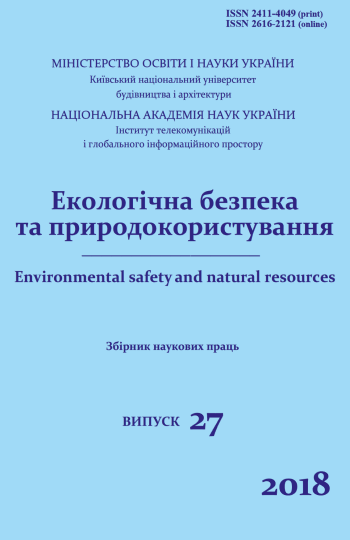The EIA gap analysis for the project of dredging works at the Southern Bug river
DOI:
https://doi.org/10.32347/2411-4049.2018.3.92-102Keywords:
biocenosis, environmental impacts assessment, gap analysis, dredging works, waste management, ecosystem transformationAbstract
The transformation of the Southern Bug river ecosystem for the revival of navigation activity has been considered in the paper from the point of indirect impacts on the environment. The method of gap analysis widely used in various branches of science has been applied to determine the omitted issues of the dredging works at the river basin. The analysis has showed that despite a range of important benefits, including promotion of agricultural and constructional materials production development, reduction of on-land cargo traffic and growing incomes to the local budget, the implementation of the project will cause additional negative effects, not considered in the official process of environmental impacts assessment. The most important problems, requiring further attention and mitigation, are intensification of erosive processes, changes of air and water quality, transformation of river biocenosis and climate of the area, as well as management of extracted bottom sediments.References
Palamarchuk, M. M., & Zakorchevna, N. B. (2001). The Water Fund of Ukraine. Kyiv: Nika-center (in Ukrainian).
Vishnevskii, V. & Kosovets, O. (2003). Hydrological characteristics of the rivers of Ukraine. Kyiv: Nika-center (in Ukrainian).
The navigable potential of the Southern Bug. (2015). Retrieved from http://www.nibulon.com/news/novini-kompanii/sudnoplavnii-potencial-pivdennogo-bugu.html (in Ukrainian).
Information for the company's stakeholders (dredging works on the Southern Bug River). (2015). Retrieved from: http://www.nibulon.com/data/investiciina-diyalnist/dlya-investoriv/informaciya-dlya-steikxolderiv-kompanii2.html (in Ukrainian).
Shooting of the Southern Bug – a threat to the ecology of the Mykolaiv region. (2015). Retrieved from: http://www.nibulon.com/news/novini-kompanii/obmilinnya-pivdennogo-bugu-zagroza-dlya-ekologii-mikolaivskogo-regionu.html (in Ukrainian).
Lowry, T., Bright, J., Close, M., Robb, C. A., White, P. A., & Cameron, S. G. (2003). Management Gap Analysis: A Case Study of Groundwater Resource Management in New Zealand. International Journal of Water Resources Development, 19, 579-592 (in English).
doi:10.1080 / 0790062032000161382.
Day, G. S. (2011). Closing the Marketing Capabilities Gap. Journal of Marketing, 75, 183-195 (in English).
Jennings, M. D. (2000). Gap analysis: concepts, methods, and recent results. Landscape Ecology, 15, 5-20 (in English).
Ariño, A. H., Chavan, V., & Otegui, J. (2016). Best Practice Guide for Data Gap Analysis for Biodiversity Stakeholders. Pamplona: Global Biodiversity Information Facility (in English).
Scott, M. J., Davis, F. W., Cusuti, B., Noss, R., Butterfield, B., Groves, C., Anderson, H., Caicco, S., D'Erchia, F., Edwards, T. C., Ulliman, J., & Wright, R. G. (1993). GAP Analysis: A Geographic Approach to the Protection of Biological Diversity. Wildlife Monographs, 123, 1–41 (in English).
Tedsen, E., Riedel, A., Weingartner, K., Azzolini, R., Guillon, F., Longo, S., Leone, C., Paadar, O., & Leonenko, A. (2014). Gap Analysis Report. Preparatory Action, Strategic Environmental Impact Assessment of Arctic. University of Lapland: Arctic Center (in English).
Ritchey, T. (2013). Morphological Gap-Analysis. Using GMA to find the Δ. Acta Morphologica Generali, 2(2), 1–15 (in English).
Denisik, G. I. (2014). Modern landscapes of the floodplain of the Southern Bug and their rational use. Scientific notes [Vinnytsia State Pedagogical University named after Mikhail Kotsiubynsky]. Series: Geography, 26, 5–11 (in Ukrainian).
Desiron, O. V., Mokin, V. B., & Kryzhanovsky, Ye. M. (2006). Geoinformation system of the basin of the Southern Bug River and its role in making managerial decisions. Water management of Ukraine, 4, 10–15 (in Ukrainian).
Khilchevsky, V. K. (Ed.). (2009). Water resources and quality of river basins of the Southern Bug River. Kyiv: Nika-center (in Ukrainian).
Kolodeev, E. I., & Zakharova, M. V. (2011). Estimation of water quality of the upper part of the Pivdennyi Buh river basin by hydrochemical indicators. Ukrainian Hydrometeorological Journal, 9, 151–157 (in Ukrainian).
Magas, N. I., & Trochimenko, A. G. (2013). Estimation of modern man-made load on the river basin of the Southern Bug. Ecological safety, 16(2), 48–52 (in Ukrainian).
Khayetsky, G. S. (2009). Environmental problems of using natural resources of the Southern Bug. Scientific notes [Vinnytsia State Pedagogical University named after Mikhail Kotsiubynsky]. Series: Geography, (19), 118–125 (in Ukrainian).
Mokin, V. B., Kryzhanovsky, Y. M., & Marushevsky, G. B. (Eds.). (2009). Ecological atlas of the basin of the Southern Bug River. Vinnytsya: Wetlands International Black Sea Program (in Ukrainian).
Kozlov, S. (2017). Environmental standard "Nibulon" – in action! Vecherny Nikolayev, No.128, p. 5 (in Russian).
"NIBULON" completed the next stage of the deepening of the Southern Bug. (2015). Retrieved from http://www.nibulon.com/news/novini-kompanii/nibulon-zavershiv-chergovii-etap-dnopogliblennya-pivdennogo-bugu.html (in Ukrainian)
Szałkiewicz, E., Jusik, S., Grygoruk, M. (2018). Status of and Perspectives on River Restoration in Europe: 310,000 Euros per Hectare of Restored River. Sustainability, 129(10), 1–15 (in English). doi:10.3390/su10010129
Environmental Impacts Statement. (2015). Retrieved from: http://www.nibulon.com/uploads/files/Zayava_1.pdf (in Ukrainian).
Sinyavsky, V. (2017). The company "NIBULON" released in the Southern Bug more than two hundred thousand copies of silver carp, white carp and carp. Nikolaevskie Novosti, No. 137, p. 3 (in Russian).
Downloads
Published
How to Cite
Issue
Section
License
Copyright (c) 2019 M.M. Radomska, O.V. Ryabchevsky, V.V. Vologzhanina, V.V. Kovalska

This work is licensed under a Creative Commons Attribution 4.0 International License.
The journal «Environmental safety and natural resources» works under Creative Commons Attribution 4.0 International (CC BY 4.0).
The licensing policy is compatible with the overwhelming majority of open access and archiving policies.

